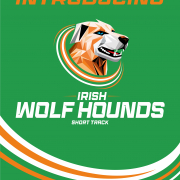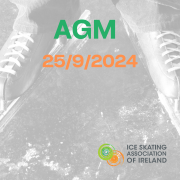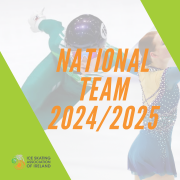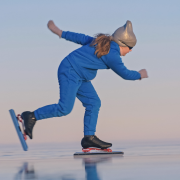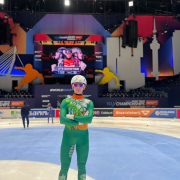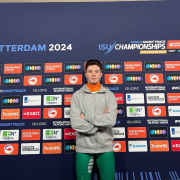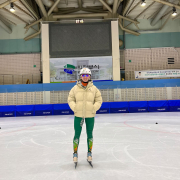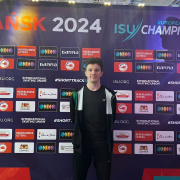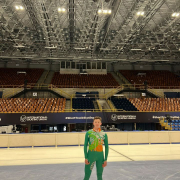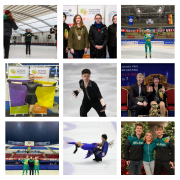2023 witnessed ice skating in Ireland continue its forward progression as more milestones were achieved.
The year began in sensational fashion in January at the ISU European Short Track Speed Skating Championships in Gdansk, Poland. Sean McAnuff became the first athlete from Ireland to nab a place in the main session of the championships when he advanced to the 500 metres quarterfinals. Liam O’Brien then went on to do the same by booking himself a spot in the 1500 metres semifinals. Later in the same month, Sam McAllister finally made his ISU European Figure Skating Championships debut at the third time of asking in Espoo, Finland. He finished in 28th place. At home, the ISAI board announced the appointment of Karen O’Sullivan as Chief Executive Officer and Yvonne Brett as Chief Financial Officer. The first post-Covid Emerald Skate test session was held at Dundrum On Ice.
February saw our short track speed skaters Sean McAnuff and Ryan McAnuff in action at events in Germany and Canada respectively, while figure skaters Dillon Judge and Laura Hegarty and Kevin Hegarty competed in the Netherlands at the Challenge Cup.
Liam O’Brien participated in the ISU World Short Track Speed Skating Championships for the third consecutive time when the event was held in Seoul, South Korea in March. Sam McAllister announced his retirement from competitive skating during the month.
Four-time European competitor Conor Stakelum was appointed ISAI Anti-Doping Officer in May.
Rounding out the 2022/2023 season, the Irish Figure Skating Championships were held for the second at the Dundee Ice Arena in June. Titles were decided in five categories with Carolane Soucisse and Shane Firus becoming the first ever Senior Ice Dance champions in the history of the event.
The 2023/2024 season got into full swing in September with two-time Irish Junior Champion Sophia Tkacheva competing at the ISU Junior Grand Prix in Istanbul, Türkiye. The appointment of Stephen Judge as ISAI Privacy Officer was announced. Margery Hilko became the first person from Ireland to qualify as an ISU judge when she passed the ISU examination in Oberstdorf, Germany.
Ciera Turner-Frick represented Ireland at the ISU Junior Grand Prix in Yerevan, Armenia in October. Dillon Judge made his international senior debut at the Tayside Trophy in Dundee, United Kingdom where he was joined by Sophia Tkacheva who skated in the Junior Women’s event. The season got under way for our short track speed skaters at World Cup 1 in Montreal, Canada where Ryan McAnuff and Liam O’Brien raced. O’Brien also entered World Cup 2 again in Montreal where he not only set a new Irish record in the 1000 metres, but also advanced to the 1000 metres quarterfinals.
In November, the 2023/2024 Emerald Skate learn to skate lessons commenced at Dundrum On Ice. Dillon Judge competed at the Denkova-Staviski Cup in Sofia, Bulgaria where he finished 10th. The ISAI Annual General Meeting was held on 29 November in Dublin. It was the first in-person AGM since 2019.
Carolane Soucisse and Shane Firus kicked off December and their season when they participated in the Bosphorus Cup in Istanbul, Türkiye. The second World Ice Skating Day took place on 3 December with bigger and better celebrations than in the previous year here in Ireland. Soucisse and Firus and Dillon Judge took part in the ISU Challenger Golden Spin of Zagreb in Croatia. Liam O’Brien was named as a recipient of a Milano Cortina 2026 Olympic Scholarship and wrapped up 2023 with back to back World Cups in China and South Korea.
2024 promises to be an even more exciting year for the ISAI as the pace picks up on the development of Ireland as an ice skating nation both domestically and on the international stage.
